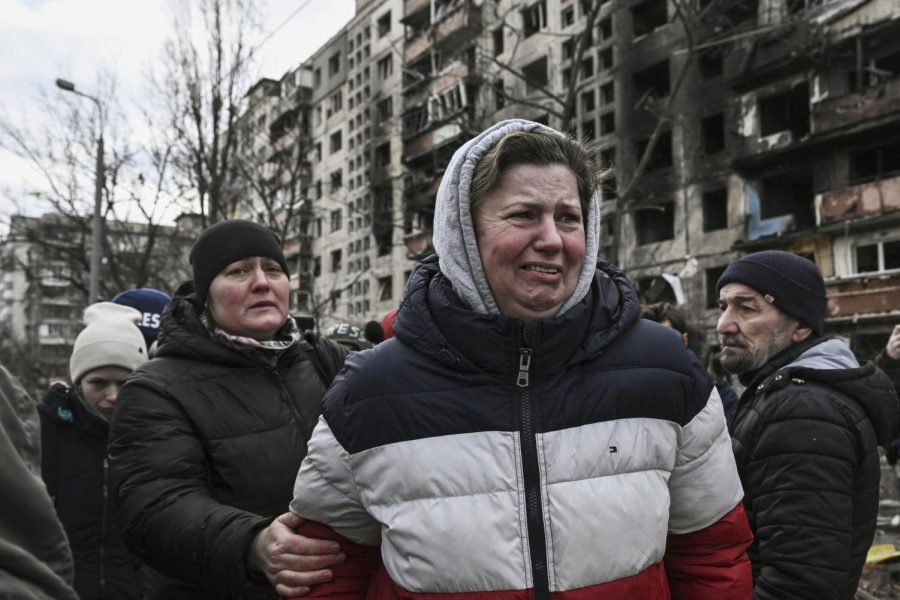Ukraine, Democracy, and “Western” Political Identity
I.
War, in an irony retraced over the course of millennia, can be a remarkable, though often fleeting, antidote for division. Perhaps, basic human instinct governs that we neglect our ongoing squabbles in the face of larger threats, that we call off our ceaseless football match of political showmanship—as it were—as looming clouds let forth their wind and rain. In the midst of aerial blitz, wedge issues, and buzzwords, ancient feuds and seasonal quarrels are best buried in pursuit of common objectives. Though, when we enter these predictable fits of flag-waving utopianism, when the nation finds itself whisked by the fervor of war, it is worthwhile to consider, “why?”
It would be fantastical to label the stature of global democracies as “united” at any point in recent history—and utterly incorrect to ascribe the adjective “peaceful” to Western nations over the course of the last half-century. Indeed, Europe has played host to dozens of conflicts, both civil and international, in the decades since World War II, and United States interventionism, alongside our NATO allies, has spurred on conflict in the Middle East throughout most of the twenty-first century. The ongoing war in Ukraine does not occur in a vacuum; rather, it follows nearly a decade of mounting conflict in separatist regions and a preliminary invasion of the country’s Crimean peninsula by Russia in 2014.
Nevertheless, for the United States, our allies in Europe, and other semi-functioning democracies around the globe, Russia’s brutal invasion of Ukraine harkens back to the warm-and-fuzzy roots of our founding, to the ideological premises America honed during the Revolutionary War, rallied during the Nazi invasion of Europe, ingrained during the Cold War, and—it appears—is resurrecting amid the Russian onslaught in Ukraine.
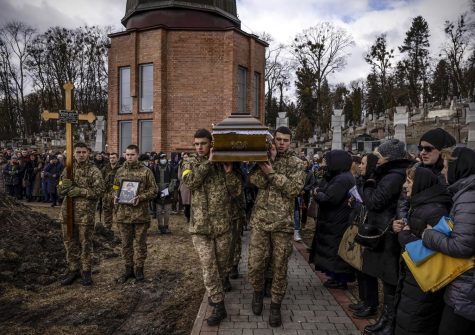
As Putin, now solidly outcast from the social scene of global leadership, sics the full might of Russia’s military against Ukraine’s comparatively meager defense force, nations of Europe alongside their major strategic allies in North America and Asia are forced to “choose sides.” For the US, long the Russian Federation’s principal geopolitical adversary (and the USSR’s before), defining a national stance in opposition to Russia is a must. Even as no NATO member state stands under direct threat, the trappings of a proxy war, steeped in the ideological and political contrasts of two goliaths, were laid the moment Putin began mounting military forces on Ukraine’s eastern border in November of last year.
Ukraine, once unsure of its position on the periphery of Europe, apprehensive about entering Western economic and defense pacts, and ever-wavering in its fraught relationship with Russia, has by will of circumstance fallen at the mercy of Western powers, to whom the country now aligns itself with impassioned fervor. As many in Ukraine have described in the past weeks, the country’s increasingly reformist political and social climate clashes sharply with Russia’s oppressive regime. The decades since the collapse of the USSR have portended the development of a free-market economy akin to those of Western Europe, a presidential-parliamentary democracy governed (mostly) by the people, and a flourishing journalistic climate sure to experience debilitating repression under Russian control.
All these circumstances coalesce to form a perfect geopolitical embodiment of “Western” —and just as importantly—American values. In other words, Ukraine has come to represent all that is “good” (freedom, post-USSR capitalism, an embrace of American popular culture), and Russia all that is “bad” (oppression, aggression, a rejection of American primacy). That is, at least, through the star-spangled tinting of our Western lenses.
And while most of us in the West acknowledge Russia as the belligerent actor in the ongoing Russo-Ukrainian War and feel genuine sentiments of bereavement at the suffering of millions of innocent civilians caught in a conflict of Putin’s creation, the larger geopolitical implications, the ideals at stake are equally powerful motivators of Western support. NATO and EU powers are by no means obliged to militarily and financially support Ukraine, yet the potent mixture of emotional terror and enduring, though embattled, loyalty to democratic values has galvanized citizens and governments across the West.
Biden has made it clear, along with the rest of NATO, that he does not seek to directly elevate the war in Ukraine to an international scale, one of grand scope and dire implications. The White House has belabored its opposition to boots-on-the-ground intervention and to a no-fly zone. In other words, the President is trying to avert a nuclear-powered World War III.
That is not to say, though, that the West has lain dormant. Economic sanctions on Russian oligarchs and markets, massive cash infusions for Ukrainian defense, and heaping war equipment shipments have ramped up drastically in the last week. Most were so wrapped up in war coverage that the passage of a 1.5 trillion-dollar spending bill went largely unnoticed—an item that included 13.6 billion dollars in Ukrainian aid. All this unified rallying, all this spending begs an existential question of Western civilization: if Putin’s behavior has required that NATO allies unite for our common defense, that European nations mobilize in an unprecedented feat of cooperation to assist a non-member state, and that the US once more embark on an ideological, economic, and military campaign of “Western democratic values,” what is our purpose?
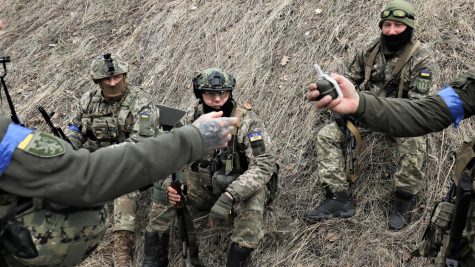
Turkey has rehabilitated its cache with fellow NATO states by donating Bayraktar drones to Ukraine. Germany is in the process of hiking military spending to levels unseen since reunification. Post-Brexit friction between the UK and EU has faded into the background of inter-alliance coaction. As things stand, the NATO and European Union coalition appears poised for action, though the enduring form that action may take remains ambiguous.
If we manage to collectively champion popular sovereignty and human rights in Ukraine, if we seek to lift a torch of liberty and avoid levying the flame of nuclear war (as we must), how will the “free world” define itself in the twenty-first century?
II.
I write this article from a hotel room in British Columbia, CBC murmuring politely from the television set. Here, in unsurprising contrast to the self-absorbed media of the United States, they air clips from a wide range of foreign leaders—they speak of ongoing policy upheaval under the leadership of German Chancellor Olaf Scholz to mobilize equipment and funds to Ukraine, of the precarious position of powerful, populous neutral nations like India, and of the global “West” in terms beyond “America.”
Much like in countries across the world, both where democracy flourishes and where it continues to endure hardships, I’ve seen hand-scrawled Ukrainian flags plastered in home windows, public monuments illuminated in blue and yellow, and have heard resounding chants for peace in city squares. I have witnessed parents from Phoenix to Vancouver, from San Antonio to San Francisco explain to their young children, in simple phrases, an ardent fight of a free people against a vicious, empire-building dictator—and I am given hope. Even amidst the reductive Russophobia, even as some continue to frame the aggressing nation as an ideological monolith in which all, from President to citizen, are guilty, I’m optimistic that many are coming to view the war in Ukraine as it is: a struggle to uphold fundamental freedoms to which all humans are entitled, personal liberties upon which Putin seeks to impinge.
It is one thing for the global West to unite in our acknowledgment, our political, economic, and military support of Ukraine and the freedom it embodies; it is wholly another task to embody those sentiments ourselves. No matter how many times we applaud Ukrainian diplomats, no matter how many celebrities come out and voice their support for Ukraine’s fight for independence, no matter how many sanctions we levy in the interest of destabilizing Russia, if America, NATO, and the EU truly seek to extend their notions of liberty to all corners of the world, they have to reframe their view of the ongoing war.
We should not view Ukraine positively solely by merit of its favorable relationship with the US and Europe. Likewise, we should not view Russia negatively solely on the basis of its deteriorating relationship with the West. Our outlook should be framed—not relative to ourselves—but rather based on the lofty principles of democratic self-governance, of fundamental human rights. We should think of the citizens of Ukraine and what can be done to further their fight, to end their suffering, not to inflate our own egos.
In America, we pride ourselves on being liberators, on being champions of democracy across the globe. In Europe, that belief is firmly established as well. Though, that same identity bears a lengthy history of oppression, colonialism, of self-presumed cultural, ethnic, civic superiority which must be combatted. So long as the West continues to view itself as the global center to which all geopolitical struggles are judged in relation, the pursuit of Democratic ideals cannot and will not be just—nor will it be successful.
III.
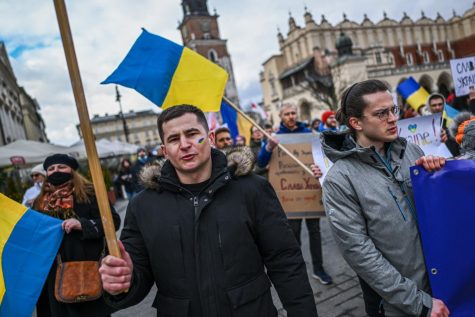 When military intervention—purportedly in the name of public salvation—fails, it has tended to be the consequence of American self-absorption and our recurrent blindness to local socio-political climates. In Libya, where the US-NATO-Arab League invasion was swift and gruesome, the 2011 assassination of Gaddafi both subverted George W. Bush’s model disarmament program and left a civically structureless nation in its wake. Internal warfare continues to rage. US involvement in Afghanistan, reaching its conclusion just last year, saw the meteoric return of Taliban leadership after two decades of pushback. Invasion and occupation, funding, and training failed to regiment Afghan Republican forces to a degree capable of effectively confronting Taliban fighters. America exited amid chaos.
When military intervention—purportedly in the name of public salvation—fails, it has tended to be the consequence of American self-absorption and our recurrent blindness to local socio-political climates. In Libya, where the US-NATO-Arab League invasion was swift and gruesome, the 2011 assassination of Gaddafi both subverted George W. Bush’s model disarmament program and left a civically structureless nation in its wake. Internal warfare continues to rage. US involvement in Afghanistan, reaching its conclusion just last year, saw the meteoric return of Taliban leadership after two decades of pushback. Invasion and occupation, funding, and training failed to regiment Afghan Republican forces to a degree capable of effectively confronting Taliban fighters. America exited amid chaos.
Our efforts to shape the country into a haven for democracy shattered as a consequence of dated and misguided political restructuring and corruption, critical flaws which could have been avoided given more conscientious, goal-oriented leadership. Indeed, the Special Inspector General for Afghan Reconstruction’s (SIGAR) post-withdrawal debrief highlights both a failure to “understand the Afghan context and therefore [failure] to tailor its efforts accordingly” and a “[continuous struggle] to develop and implement a coherent strategy for what it hoped to achieve.”
Today, our struggle is in Ukraine. We cannot invade, and we cannot enforce a no-fly zone. We cannot reason with Putin, nor can we count on sanctions to impede the Russian onslaught. Millions have fled their homes, thousands have taken up arms. Diplomacy falters, shelling beats on, and Zelensky “Zooms” into Parliament and Congress.
But Western partnerships are energized and strengthened, our economic spheres now engage in sweeping multilateral maneuvers to undercut Russian banks and oligarchs. By all accounts, Ukraine is backed (at a distance) by a bulwark of military and financial aid. A war whose outcome once appeared predetermined is now in contention. The will of the Ukrainian people to maintain their independence, previously underestimated, now garners parallels to the mettle of Britons during The Blitz of World War II. Regardless of how many missile systems we ship and how many billions of dollars we wire, the war is hardly finished.
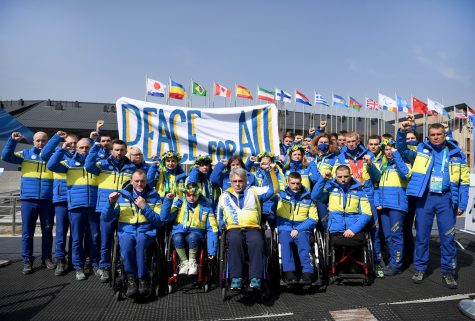
Amidst the Ukrainian struggle for sovereignty, the conflict both physical and financial, there emerges a broader battle in the hearts of civilians everywhere—one which Ukraine is sure to win. Echoes of Roosevelt and Churchill, those distant declarations of resistance to tyranny, testaments to the triumph of democracy over authoritarianism, find an unexpected voice in Zelensky and his people. Ukrainians fight—not just to preserve their independence—but to sustain a torch of freedom from the crushing gusts of autocracy.
For the US and our allies in Europe, let this war remind us of the light which should guide our identity in the wake of the war in Ukraine: people, their quests for stability and prosperity, for agency and liberty.

Lorenzo Ruiz, a senior, is a Coeditor-in-Chief. An enthusiast of government and current events, his hobbies include debate, Academic WorldQuest, Model...

